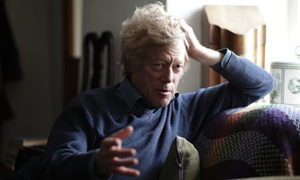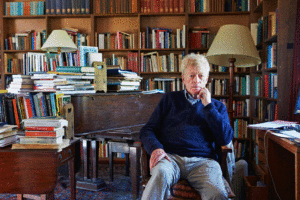Not long into David Cameron’s first term as Prime Minister, the conservative philosopher Roger Scruton refounded an old Tory dining club that had, for a short time in the Seventies, exerted an outsized influence on British politics. The Conservative Philosophy Group had been a meeting place for some of the greatest conservative intellectuals, journalists and politicians of the 20th century, from F. A. Hayek to Milton Friedman, Harold Macmillan to Margaret Thatcher. It was, professor John Casey later wrote, “a very odd moment in the history of the Tory party when it decided to lie back and enjoy ideas”. By the time John Major had taken over, ideas were less in vogue.
Scruton’s had the gnawing sense that the Conservative party had wasted its time out of power. “During 13 years of opposition the Tory Party had the opportunity to think,” Scruton wrote despairingly. “[But] the Party entered into coalition government with virtually no intellectual contribution of its own.” By resurrecting his club, he hoped to recapture some of its original energy and purpose and inject some intellectual vigour into Cameron’s Tories. “He did not succeed,” his friend Paul Goodman, then editor of Conservative Home, noted dryly.
Perhaps this is the fate of all restorationists, romantically driven to recreate long-lost worlds which cannot be brought back from the dead. Either way, I could not help thinking of Scruton after speaking to some of the new Labour MPs, ministers and aides enjoying their first taste of power in 14 years, bouncing from summit to summit, press conference to press conference, excited by it all but not yet quite sure what they are hoping to achieve or how.
In one sense, this is only natural. We are not even two weeks into what might yet be a decade of Starmerite rule. Nevertheless, I have already been struck by the strange sense of disorder lurking just under the surface of this government — the sense that the struggle to settle the hierarchy in the court of King Starmer is still playing out. This confusion about who really holds the authority in No 10 is fuelling a strange unease among Labour aides, even a paranoia about their own prospects. And so soon.
One charitable explanation is that it is little more than the inevitable result of the sudden transfer of power. Unlike many other countries, there is no formal transition here: it takes place in an ill-defined and ad-hoc fashion and a period of mild upheaval is the inevitable result.
Remember that barely two months ago, almost everyone in British politics — including the Labour Party and the civil service — expected the general election to take place in November. Instead, it is July and Labour is in power and being asked to negotiate communiques at Nato summits it never expected to attend and to host European Political Community summits at Blenheim Palace it played no role in preparing. For all the sugary homilies to the beauty of the British political system compared with the chaotic scenes in the United States or France, there is also a case for saying this is not a very sensible way to run a modern bureaucratic state.
Another explanation, however, is that the uncertainty within No. 10 and the Government overall is the result of an ongoing power struggle taking place between Sue Gray and Morgan McSweeney, Starmer’s two most important aides. This was certainly the analysis of at least two senior figures I spoke to. They maintain McSweeney has Starmer’s ear, reporting directly to the Prime Minister as his chief political strategist, responsible for setting the direction of the Government. In his team are some of the most important figures in the new Downing Street: Paul Ovenden, Vidhya Alekson, Henna Shah, Claire Stewart. Those who know McSweeney well say since the election he has remained purposefully in the shadows, less visible than Sue Gray, but that he has emerged with his influence enhanced.
Everyone, it seems, is figuring out what to do. This is the transition period. In the Treasury, Rachel Reeves is working out how to break the bad news that taxes will have to rise, while in the Justice Department, Shabana Mahmood is locked away trying to work out what on earth to do about the prison fiasco she has inherited. In defence, John Healey has commissioned former Nato general secretary, George Robertson, and ex-Trump administration official, Fiona Hill, to come up with the framework for the government’s security policy, while the new Foreign Secretary David Lammy has begun working out how to change the “vibes” in British foreign policy before moving onto any substantive changes.
All of this might be sensible, but it is striking how little actual policy has been pre-prepared in opposition, other than Reeves’ changes to the planning laws and Ed Miliband’s tweaks to make it easier to erect onshore wind turbines and build solar farms. These might be important reforms, but they are not defining policies — and certainly not on the scale of Bank of England independence announced shortly after Labour’s election victory in 1997. Nor do they tell a wider story about the ideals of this Government.
On the question of Europe, for example, despite some more excitable headlines, the ambition is limited — at least in the short term. There are clear red lines: no rejoining the EU, no single market, no customs union, no freedom of movement and no unpicking the Windsor Agreement managing the Irish Sea border with Northern Ireland. As long as these boundaries remain in place, there is not a huge amount that can be done to radically reshape Britain’s relationship with the EU.
The ambition, in effect, is to create a new post-Brexit relationship. Beyond that a lot still remains up in the air. Should the new defence review prioritise Britain’s relationship with the EU over a global role? There is a push among some of the Cameron-era diplomats for this, but it quickly runs up against substantive new developments which have happened since 2016: AUKUS, say, or the growing security partnership with Japan. There is little in the biographies of George Robertson and Fiona Hill to suggest they would recommend anything which jeopardised these developments or the ties with the United States. And there is little in it for the French in opening up the EU’s procurement rules to British defence firms.
More important, though, there is no obvious overarching narrative tying these various challenges together in one clear story about the mission of this government. The closest Keir Starmer has come to telling this story was at the Labour party conference last year when he reached into the Labour party’s past. “If you think our job in 1997 was to rebuild a crumbling public realm; that in 1964 it was to modernise an economy left behind by the pace of technology; in 1945 to build a new Britain out of the trauma of collective sacrifice,” he declared: “Then in 2024 it will have to be all three.” This was a neat summation of the challenge, but did not dwell on the moral of the story he was trying to tell: why Britain needed rebuilding and upon which principles it should be rebuilt? Was Britain too unequal to succeed before or just too poor? Was it too open to global markets or too closed; too short-termist in its outlook or too bloated and inefficient? Was the state broken, as Dominic Cummings and Tony Blair have argued in different ways, or simply underfunded? What was the fundamental cause of Britain’s problems and the moral failing at the root of this failure?
The Tories, in their last few months, attempted to narrow down the mission of government to a single word: “growth.” The problem for Labour is that “growth” alone is not a political mission and in one sense is actually profoundly anti-political, devoid of any moral content. For Margaret Thatcher, for example, growth would come once the moral defects of the state were cured. What was needed was strength and thrift: Methodism in practice. For Harold Wilson, growth would come once the amateur gentleman running things moved over for the clever men of tomorrow to take charge. What was needed was national planning: Socialism in practice.
When Scruton refounded the Conservative Philosophy Group he hoped to prompt a re-examination of “the core beliefs and assumptions of Tory politics”, so the party could take the lead on what he saw as the big issues of the day: “The environment, marriage and the family, the place of religion in the public square, press freedom, policing, the armed forces.” What are the core beliefs and assumptions for either party on such issues and into the next generation as we attempt to manage our demographic decline, build social cohesion, ensure safe tenure of housing and protect the beauty in our country while building the houses we need? What are the Labour or Tory positions on these questions — and based on which principles?
Though Scruton was a conservative, his writings have useful lessons for both parties. In 2017 he wrote Where We Are, which he described as “a personal response to the ‘Brexit’ decision”. The book, Scruton argued, was neither an argument for nor against Brexit, but rather an attempt to understand how to “bring the ‘leavers’ and the ‘remainers’ together” in a new national endeavour. In many senses this task has fallen to the new Labour government: to Make Brexit Work.
One of the problems facing Remainers in the referendum, Scruton argued, was that too many “sounded like people who could settle anywhere and always be on top of things”. For those who did not feel like that, the question of who governed us and from where was more important. In Scruton’s view this was because there were simply more important things than economics or geopolitics, most notably people’s sense of identity: “Who are we, where are we, and what holds us together in a shared political order?”
Labour would only regain its status as a party of government, he thought, “if it recognises the residual patriotism of its traditional voters, and concedes that it is possible to be a working-class socialist, a believer in national sovereignty, and a normal decent human being, who is neither racist nor xenophobic when it comes to dealing with the wider world”. Morgan McSweeney might well have uttered this at any time since Starmer became Labour leader in 2020.
Growth, while helpful for ensuring national stability, was not the most important thing, said Scruton: “It depends far more upon this sense that we belong together.” Such an observation should not be controversial for the socialist who believes in solidarity and collective action. But his analysis also demands the intellectual curiosity of the Conservative. If the job of a national government is to conserve a sense of national unity, as Scruton wrote, then the free market is not enough.
One way to understand the role of government in Scruton’s view, then, is to create a sense of “home” where people become at ease in the shared comforts and rules governing them. This, in a sense, was the Scrutonian answer to the question of “populism” which Labour MPs are already defining as the central mission of this government. “When human beings cease their wandering and mark out a place of their own, their first instinct is to furnish it with things which have no function — ornaments, pictures, knick-knacks,” he had written in England: An Elegy published in 2000. “This instinct for the purposeless has a purpose — namely to make these objects into an expression of ourselves and our common dwelling place, to endow them with the marks of order, legitimacy and peaceful possession.” If this were true of our personal lives, it was true of our national life too: he believed in the knick-knacks of the state; the black rod and the King’s speech; archaic parliamentary language and oddities of the House of Lords. For politics to tread more lightly on people’s lives, as Starmer has repeatedly declared as his aim, people need to feel at home — comfortable in the predictable order of the nation.
“When people feel at home, they allow themselves freedoms, hobbies and eccentricities,” Scurton wrote. “They become amateurs, experts and cranks. They collect stamps, butterflies or biscuit tins; they grow vegetables so large that nobody can eat them, and breed dogs so ugly that only Englishman could look them in what might charitably be called the face.” And they stop being so angry. In Scruton’s view, it was only when such contented order began to be lost, that people began to understand what it was that they were losing—the fate we are now living through in our age of disorder. “‘The owl of Minerva spreads its wings only with the gathering of the dusk,” Scruton liked to quote of Hegel.
The mission of Keir Starmer’s government, is to find a post-Brexit settlement in which the tensions which have roiled the country for so long finally settle into a more peaceful national contentment where populism and separatism are no longer so attractive to voters. To do so, Starmer does not need to make Britain great again, he needs to make it feel like home. Bring forth the doileys of State.
Disclaimer
Some of the posts we share are controversial and we do not necessarily agree with them in the whole extend. Sometimes we agree with the content or part of it but we do not agree with the narration or language. Nevertheless we find them somehow interesting, valuable and/or informative or we share them, because we strongly believe in freedom of speech, free press and journalism. We strongly encourage you to have a critical approach to all the content, do your own research and analysis to build your own opinion.
We would be glad to have your feedback.
Source: UnHerd Read the original article here: https://unherd.com/





